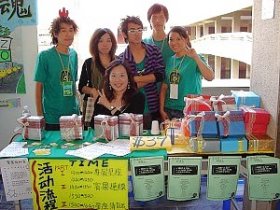A Model of Service - Learning with Compassion Second to None

The results have been fruitful. Under the guidance of teachers, service-learning has been fused into courses and students have walked out of classrooms to participate in community services. Huang Chiung-yi, a lecturer at Southern Taiwan University, combines service-learning with charity activities through her Advertising and Marketing class and guides students in organizing large charity sales every year to help the disabled. The effort is highly regarded by people in Tainan City.
Kao I-ting, an instructor at the Technology and Science Institute of Northern Taiwan, believes teaching students how to approach people to offer assistance is even more important than rendering the actual assistance.
Southern Taiwan University - To Serve with Compassion without Reservation
Huang Chiung-yi, a lecturer at the Department of Information and Communication of Southern Taiwan University, brings her Advertising and Marketing class to communities for students to experience service-learning through actual organization of public service activities.
Since students don't have much money, according to Huang Chiung-yi, they can only work with donated or discarded objects. Through their creative efforts, these used products become unique and appealing. She encourages students to sell these products. This gives them the opportunity to learn marketing. Donating the proceeds to social welfare organizations allows students to experience the pleasure of helping other people. For the past six years, each charity sales event has attracted large crowds of people.
Through this class, Huang Chiung-yi hopes students can learn to give, learn from mistakes, plan and design, be thankful and communicate. They organize charity sales to help the needy and, at the same time, learn to solve problems when encountering setbacks and failures throughout the process. This is more beneficial than learning advertising and marketing in the classroom.
Technology and Science Institute of Northern Taiwan -Picture Book Games for Schoolchildren
Kao I-ting, an instructor at the Technology and Science Institute of Northern Taiwan, targets "Peer-assistance, Experience-based Education and Family Education" as the primary means of training students to help others. The course is designed to allow students to establish trust through cooperation and interaction with different organizations and learn to manage their emotions and cope with pressure through various activities.
Once the students have built up a certain level of ability, they are allowed to offer services at Li Nong Elementary School in Taipei City. They learn how to discern what children are thinking by reading picture book stories to them, designing games integrated with the concept of family education, and playing the games with children. Many university students have come to realize their own problems from observing schoolchildren and begun to gradually readjust their own thinking.
They also pay irregular visits to retirement homes to provide services. One time a student suddenly realized people should care for their elders no matter how busy they were.
Kao I-ting comments that service-learning has changed a lot of university students and made them learn to be grateful. They become kinder and care about the needs of other people, not just their own, and this is the most important goal of service-learning.
Attachment(s) for download
- Chinese textChinese text.doc
